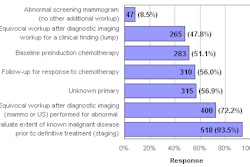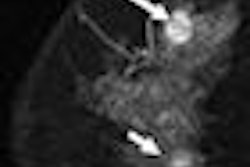Patients who develop acute allergic reactions to contrast medications can be safely treated with commonly used drugs, but care must be taken to follow guidelines, say researchers from the University of Michigan in Ann Arbor.
Their study reviewed 84,928 IV injections of nonionic iodinated contrast media in adult patients, of whom 545 (0.6%) had allergic-like reactions. A total of 221 patients were treated, most commonly with diphenhydramine (n = 145, 27%), corticosteroids (n = 17), albuterol (n = 17), epinephrine (n =15), and nitroglycerin (n = 8) (American Journal of Roentgenology, August 2008, Vol. 191:2, pp. 409-415).
The researchers found that 99% of the reactions resolved completely within 24 hours, including in 418 patients with mild reactions, 116 with moderate reactions, and nine of 11 patients with severe reactions. The most serious cases of morbidity were in two patients who received a nonrecommended treatment: 1 mg of epinephrine in the absence of cardiopulmonary arrest. Both patients had cardiopulmonary complications that were, fortunately, mild and transient, according to lead investigator Dr. Carolyn Wang from the Ann Arbor facility.
The study revealed several other instances in which nonrecommended treatments were provided, including administration of oxygen by nasal cannula rather than by mask and at lower-than-recommended doses. Also reported was the overutilization of diphenhydramine, including in a few patients who were hypotensive, as well as administration of higher-than-recommended doses of epinephrine. Finally, there was confusion about which concentrations of epinephrine should be injected subcutaneously versus intravenously, the researchers said in a statement.
The group recommended that facilities review their treatment algorithms for responding to allergic-like reactions from contrast agents at least twice a year. The vast majority of patients recover promptly without long-term complications, they concluded.
Related Reading
Reaction to contrast agents may occur despite premedication, February 28, 2008
Targeted renal therapy offers a solution to contrast allergic reactions, February 19, 2008
Copyright © 2008 AuntMinnie.com



















